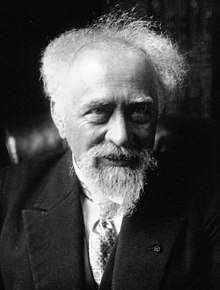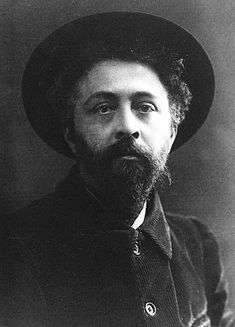Jean Baptiste Perrin
Jean Baptiste Perrin ForMemRS[1] (30 September 1870 – 17 April 1942) was a French physicist who, in his studies of the Brownian motion of minute particles suspended in liquids, verified Albert Einstein’s explanation of this phenomenon and thereby confirmed the atomic nature of matter (sedimentation equilibrium). For this achievement he was honoured with the Nobel Prize for Physics in 1926.[2]
Jean Baptiste Perrin | |
|---|---|
 Perrin in 1926 | |
| Born | 30 September 1870 |
| Died | 17 April 1942 (aged 71) |
| Nationality | France |
| Alma mater | École Normale Supérieure University of Paris |
| Known for | Nature of cathode rays Brownian motion Avogadro constant Sedimentation equilibrium Perrin friction factors |
| Awards | Matteucci Medal (1911) Nobel Prize in Physics (1926) |
| Scientific career | |
| Fields | Physics |
| Institutions | École Normale Supérieure University of Paris |
| Signature | |
 | |
Biography
Early years
Born in Lille, France, Perrin attended the École Normale Supérieure, the elite grande école in Paris. He became an assistant at the school during the period of 1894–97 when he began the study of cathode rays and X-rays. He was awarded the degree of docteur ès sciences (PhD) in 1897. In the same year he was appointed as a lecturer in physical chemistry at the Sorbonne, Paris. He became a professor at the University in 1910, holding this post until the German occupation of France during World War II.
_Cantacuz%C3%A8ne_et_Jean_Perrin_en_1931.jpg)
Research and achievements

In 1895, Perrin showed that cathode rays were of negative electric charge in nature. He determined Avogadro's number (now known as the Avogadro constant) by several methods. He explained solar energy as due to the thermonuclear reactions of hydrogen.
After Albert Einstein published (1905) his theoretical explanation of Brownian motion in terms of atoms, Perrin did the experimental work to test and verify Einstein's predictions, thereby settling the century-long dispute about John Dalton's atomic theory. Carl Benedicks argued Perrin should receive the Nobel Prize in Physics; Perrin received the award in 1926 for this and other work on the discontinuous structure of matter, which put a definite end to the long struggle regarding the question of the physical reality of molecules.[3]
Perrin was the author of a number of books and dissertations. Most notable of his publications were: "Rayons cathodiques et rayons X"; "Les Principes"; "Electrisation de contact"; "Réalité moléculaire"; "Matière et Lumière"; "Lumière et Reaction chimique".
Perrin was also the recipient of numerous prestigious awards including the Joule Prize of the Royal Society in 1896 and the La Caze Prize of the French Academy of Sciences. He was twice appointed a member of the Solvay Committee at Brussels in 1911 and in 1921. He also held memberships with the Royal Society of London and with the Academies of Sciences of Belgium, Sweden, Turin, Prague, Romania and China. He became a Commander of the Legion of Honour in 1926 and was made Commander of the Order of Léopold (Belgium).
In 1919, Perrin proposed that nuclear reactions can provide the source of energy in stars. He realized that the mass of a helium atom is less than that of four atoms of hydrogen, and that the mass-energy equivalence of Einstein implies that the nuclear fusion (4 H → He) could liberate sufficient energy to make stars shine for billions of years.[4] A similar theory was first proposed by American chemist William Draper Harkins in 1915.[5][6] It remained for Hans Bethe and Carl Friedrich von Weizsäcker to determine the detailed mechanism of stellar nucleosynthesis during the 1930s.[7]
In 1927, he founded the Institut de Biologie Physico-Chimique together with chemist André Job and physiologist André Mayer. Funding was provided by Edmond James de Rothschild.[8] In 1937, Perrin established the Palais de la Découverte, a science museum in Paris.
Perrin is considered the founding father of the National Centre for Scientific Research (Centre National de la Recherche Scientifique (CNRS)). Following a petition by Perrin signed by over 80 scientists, among them eight Nobel Prize laureates, the French education minister set up the Conseil Supérieur de la Recherche Scientifique (French National Research Council) in April 1933. In 1936, Perrin, now an undersecretary for research, founded the Service Central de la Recherche Scientifique (French Central Agency for Scientific Research).[8] Both institutions were merged under the CNRS umbrella on October 19, 1939.[9]
His notable students include Pierre Victor Auger. Jean Perrin was the father of Francis Perrin, also a physicist.
Personal life
Perrin was an atheist and a socialist.[10] He was an officer in the engineer corps during World War I. When the Germans invaded France in 1940, he escaped to the U.S.A., together with his partner Nine Choucroun. He died in New York City. After the War, in 1948, his remains were transported back to France by the cruiser Jeanne d'Arc and buried in the Panthéon.
Works
- Les Principes. Exposé de thermodynamique (1901)/Principles of thermodynamics
- Traité de chimie physique. Les principes (1903)/Physical chemistry principles
- Les Preuves de la réalité moléculaire (1911)/Evidences of molecular reality
- Les Atomes (1913)/The Atoms
- Matière et lumière (1919)/Matter and light
- En l'honneur de Madame Pierre Curie et de la découverte du Radium (1922)/ In honor of Mrs Pierre Curie and the discovery of Radium
- Les Éléments de la physique (1929)/Elements of physics
- L'Orientation actuelle des sciences (1930)/Current orientation of sciences
- Les Formes chimiques de transition (1931)/Transition chemical forms
- La Recherche scientifique (1933)/Scientific research
- Cours de chimie. 1ère partie. Chimie générale et métalloïdes (1935)/ Chemistry courses: general chemistry and metalloids
- Grains de matière et grains de lumière (1935)/Grains of matter and grains of light
- Existence des grains/Existence of grains
- Structure des atomes/Structure of atoms
- Noyaux des atomes/Kernels of atoms
- Transmutations provoquées/Induced transmutations
- Paul Painlevé: l'homme (1936)/Paul Painlevé: the man
- L'Organisation de la recherche scientifique en France (1938)/The organisation of scientific research in France
- À la surface des choses (1940-1941)/At the surface of things
- Masse et gravitation (1940)/Mass and gravitation
- Lumière (1940)/Light
- Espace et temps (1940)/Space and time
- Forces et travail (1940)/Forces and work
- Relativité (1941)/Relativity
- Électricité (1941)/Electricity
- L'énergie (1941)/Energy
- Évolution (1941)/Evolution
- L'Âme de la France éternelle (1942)/The soul of eternal France
- Pour la Libération (1942)/For Liberation
- La Science et l'Espérance (1948)/Science and hope
- Oeuvres scientifiques de Jean Perrin (1950)/Scientific works of Jean Perrin
References
- Townsend, J. S. (1943). "Jean Baptiste Perrin. 1870-1942". Obituary Notices of Fellows of the Royal Society. 4 (12): 301–326. doi:10.1098/rsbm.1943.0004.
- Kyle, R. A. (1979). "Jean Baptiste Perrin". JAMA: The Journal of the American Medical Association. 242 (8): 744. doi:10.1001/jama.242.8.744. PMID 379381.
- Mauro Dardo (2004). Nobel Laureates and Twentieth-Century Physics. Cambridge University Press. pp. 114–116. ISBN 0521540089. Retrieved 13 February 2014.
- Why the Stars Shine D.Selle, Guidestar (Houston Astronomical Society), October 2012, p.6-8
- N.C.Panda (1991). Māyā in Physics. Motilal Banarsidess (Delhi). p. 173. ISBN 81-208-0698-0.
- Robert S. Mulliken (1975). "William Draper Harkins 1873 - 1951" (PDF). Biographical Memoirs. National Academy of Sciences. 47: 48–81.
- John North, Cosmos: An Illustrated History of Astronomy and Cosmology (University of Chicago Press, p.545)
- Zeitoun, Charline (September 2009). "Le CNRS a 70 ans". CNRS le journal. Retrieved February 23, 2012.
- Guthleben, Denis (November 3, 2010). "Un peu d'histoire... La création du CNRS". Comité pour l’histoire du CNRS. Retrieved February 23, 2012.
- Bernard Valeur, Jean-Claude Brochon (2001). New Trends in Fluorescence Spectroscopy: Applications to Chemical and Life Sciences. Springer. p. 17. ISBN 978-3-540-67779-6.
Jean and Francis Perrin held similar political and philosophical ideas. Both were socialists and atheists.
CS1 maint: uses authors parameter (link)
External links
| Wikimedia Commons has media related to Jean Perrin. |
- 1926 Nobel Prize
- Works by or about Jean Baptiste Perrin at Internet Archive
- Mouvement brownien et molécules, by Jean Perrin, 1923 on Vidéothèque du CNRS (French)
- Jean Perrin et la réalité moléculaire on Vidéothèque du CNRS (French)
